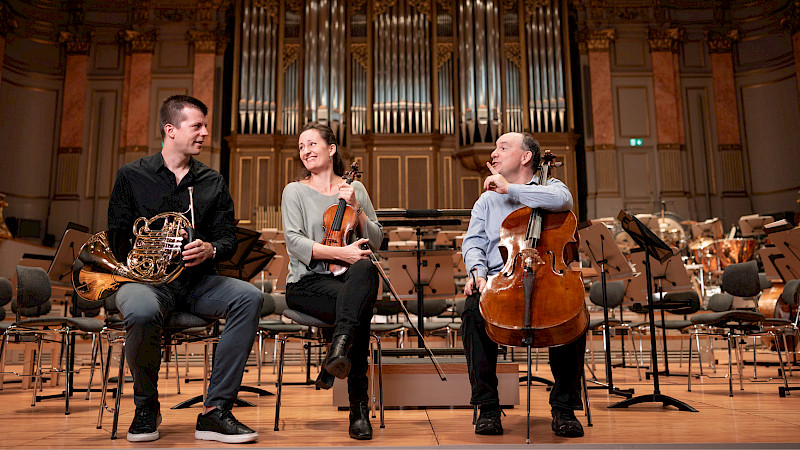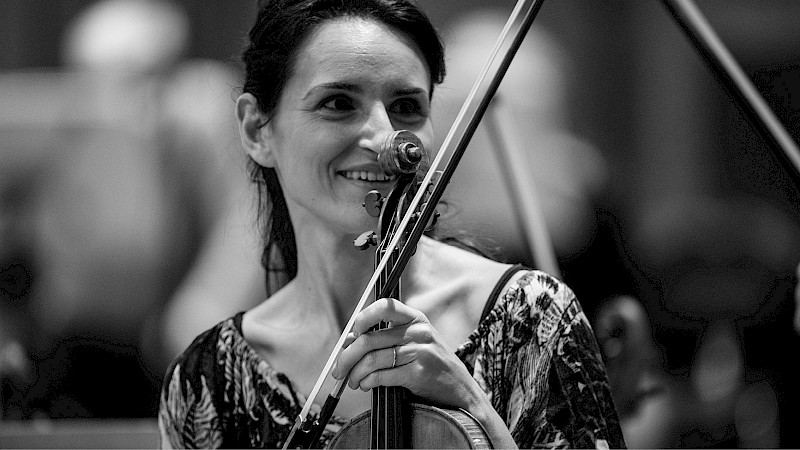
"It's going to be a spectacle!"
In December 2023, there was a premiere with reverberations: the entire cello section of the Tonhalle-Orchester Zürich performed together with Kian Soltani. That's why our cellists are now forming their own ensemble. Christian Proske and Benjamin Nyffenegger reveal their plans.
Let's take a look back: was the concert with Kian Soltani actually the first in this register formation?
Christian Proske: There was a project that I once organised, but that was probably 17 years or more ago. It was called "Cello do Brasil". We played the "Bachianas Brasileiras" by Heitor Villa-Lobos, which were written for cello ensemble. We combined this with three viol sonatas by Johann Sebastian Bach, arranged for three cellos each. This programme was very well received at the time. And the project with Kian last season, which was so much fun for everyone - on and off stage and also in the audience - gave us the impetus: let's get on with it.
Benjamin Nyffenegger: We already have pure cello ensembles in the orchestra, as a cello quartet and cello quintet. I've just been on tour with my ensemble. It has to be said that there really are a lot of concerts at the moment that are performed exclusively by cellos. It's simply a great trend. Kian himself is enthusiastic about the idea of cello ensembles and has often done this with orchestras when he has been a guest - and on his CD "Cello Unlimited" he has also recorded around 200 tracks of film music that are actually for orchestra. That shows: You really can do a lot with cellos.
What is so special about this instrumentation?
BN Cellists don't actually need much more than other cellists. That's enough for us ... (laughs). Of course, it's nice to have violins and violas, but theoretically it works with just cellos. The instrument has this warmth and sensuality. It triggers something in many people, even in arrangements. And for us who play it, it's simply the most beautiful instrument of all.
CP In addition to repertoire classics such as Villa-Lobos, there are now also numerous top-level arrangements that cover everything the cello has to offer: from the highest highs to the deepest lows.
There are famous role models such as the 12 cellists of the Berlin Philharmonic Orchestra, which was founded in 1972. Is there a connection to the repertoire?
BN Of course, a lot of things were initiated by the Berliners. But there is also a long tradition of composing cellists that goes back much further. Boccherini, for example, often wrote for two cellos in his chamber music. The Schubert Quintet is also a famous example. Bernhard Romberg, Julius Klengel, all these cellists composed original works very early on. So I suspect that this complacency on the part of cellists is historically conditioned ... (laughs). And we have just given two masterclasses in the Netherlands. It turned out that there is still a treasure trove of over 80 original compositions for cello octet from the 20th century lying dormant there. I hope that we will be able to revive some of them. But in our case, there are also promising new impulses from our own soloists. Paul Handschke arranged Dvořák's cello concerto for solo cello and four cellos for his diploma when he was still a student and an intern with us. I played in his graduation concerto. We still perform this arrangement very often and are explicitly invited to play it at concerts and festivals. Paul really has a great talent, his arrangements are marvellous. And Christian has put together the programme for our new project, which he does very well. It's simply a great cello group with incredibly good musicians. We've been talking for years about the fact that we should actually do something about it.
CP There are more and more good orchestras with established cello ensembles. The ElphCellists would be another example. Some are becoming more serious, and that goes hand in hand with the development of suitable repertoire. Overall, it's a process of growth. I think that fits in perfectly with our cello group, especially as it really does harmonise well and is quite balanced. We've just got a new member, Sandro Meszaros, and we're complete again. So it's a wonderful fit right now.
Why is that? What does that mean for the interaction in the orchestra?
BN The appeal of this line-up is that everyone has to play something really demanding individually. That is a challenge. And in the context of an orchestra, it's important that the young colleagues in particular feel this appreciation from us who have been there for a long time. In the ensemble, we play as equals. They are heard and appreciated. And last but not least, the fun factor is simply enormous.
CP Competitive would be too strong a word. But it's about distributing the voices well and evenly. It's not about some people always playing in the lower range and others always being able to make a name for themselves. It should be fair. But that's already the case in most well-set pieces anyway. That's important. And when there are twelve of us playing without a conductor, we have to function solely through contact. This is a win-win situation for us as a group, which we can transfer from chamber music to the orchestral context.
Is this really still chamber music? Or is there someone who leads the group?
BN It is chamber music, but with a plus. And in terms of leadership, I believe that this is distributed quite appropriately among us due to the respective personality structure. There are colleagues who like to express themselves and others who are more reserved. There is actually no hierarchical thinking in chamber music. Everyone is important because only he or she has this voice to play. This also means that everyone sees the piece from a completely different perspective. And then suddenly there are middle voices that you want to bring out. In my view, this in turn speaks strongly in favour of arranging symphonies, for example, for such a formation. With works that we know very well, we can bring out completely different things.
CP I'm already curious to see how this will work out in practice. In such a large group of twelve, you need some kind of structure. One of the twelve Berliners once said in an interview: The most important thing he had learnt was to think carefully about when to say what and whether it was really necessary. That's true, of course. Because the rehearsal time is manageable. BN Play more, speak less! That's always a good thing. And I'm personally very sure that this project for the cello group will also have a positive impact on the orchestra. We musicians are sensitive animals. You don't just want to swim along, you want to be part of this project. The appreciation and being challenged kindles a certain fire.
Anna Thorvaldsdottir, Creative Chair of the 2024/25 season, also fits into the aforementioned tradition of composers who played or play the cello themselves. Her work "Mikros" opens your programme in December. How did it come about?
CP The piece "Mikros" fits in well with the theme of this season's chamber music lunch concerts - "Iceland in the context of Nordic music". It was originally composed for solo cello and two band recordings. This results in three voices, which is also available in a version for three cellos. Of course, we'll do this version. This is followed by an arrangement of Edvard Grieg's "Peer Gynt" suite. The programme is rounded off with an arrangement of Tchaikovsky's "Nutcracker" suite, a great, rousing piece that fits perfectly into the Advent season. I've already played it twice with other ensembles: It's very demanding and great fun at the same time.
BN That's the great thing about a cello ensemble. You can actually programme anything. There's more to every theme than you can imagine. And you can be sure it will be a spectacle!
What project ideas would you like to realise in the future?
CP At the moment, the idea is to realise one ensemble project per season - and now to fill the Grosse Tonhalle in December!
BN I have no doubts about that. Concerts by cello ensembles are always sold out, precisely because it's something so special. My goal would be to really be able to do a full-length programme, because there are just so many fantastic, crazy, really good things to play. And I have the feeling that it would be most meaningful and valuable for us to interpret great works. We know many symphonies inside out. What we could do with them as a cello group would be something completely different to the well-known cello pieces that you might have heard before.
We use deepL.com for our translations into English.







